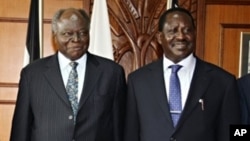Kenya’s Independent Electoral and Boundaries Commission (IEBC) has promised to organize a credible vote in the March 4th general election following a meeting with political parties.
IEBC Commissioner Yusuf Nzibo says the electoral body has also updated its policies and practices to ensure the elections are peaceful and transparent.
“We have procured the necessary verification machines to ensure that whoever turns up at the polling station on Election Day will be the person registered,” said Nzibo.
“We are confident that we shall be able to hold free and fair elections and we had an international conference about the need to prepare for the second round [of voting] in case there is no clear winner in the first round of election,” he added.
The IEBC, Nzibo says, is working with Kenya’s political parties to improve the way elections are organized in hopes of preventing potential disputes over voting that he says can trigger violence.
“We have been meeting the political parties and the security agencies and other constitutional commissions to really work out the need for a peaceful election,” said Nzibo.
He says both local and international election observer groups have been invited to monitor the vote.
“We are guaranteeing the public and the international community that we shall be free, fair and transparent. We have also invited international and local observers to come in to observe our elections,” said Nzibo.
Analysts say the vote in March will be hotly contested because President Mwai Kibaki is set to retire. Some Kenyans attribute the 2007-2008 post-election violence to disputes over voting totals. The dispute left an estimated 1,133 people killed and displaced hundreds of thousands from their homes.
Nzibo says the IEBC has launched campaigns seeking cooperation from the political parties as well as to educate the general public ahead of the vote.
“The parties have signed the code of conduct, which will guide both the candidates and also the political parties in terms of having a peaceful during campaigns and during the elections,” said Nzibo.
He says the IEBC has instituted transparency in the transmission of poll results, which he says will be broadcast on radio and television.
“We shall be transmitting the results live through the internet. So there would be transparency in terms of the announcement of the results that anywhere in the world you can see the results as they trickle in, and you can compare to what is being announced at the level of the polling stations,” said Nzibo.
IEBC Commissioner Yusuf Nzibo says the electoral body has also updated its policies and practices to ensure the elections are peaceful and transparent.
“We have procured the necessary verification machines to ensure that whoever turns up at the polling station on Election Day will be the person registered,” said Nzibo.
“We are confident that we shall be able to hold free and fair elections and we had an international conference about the need to prepare for the second round [of voting] in case there is no clear winner in the first round of election,” he added.
The IEBC, Nzibo says, is working with Kenya’s political parties to improve the way elections are organized in hopes of preventing potential disputes over voting that he says can trigger violence.
“We have been meeting the political parties and the security agencies and other constitutional commissions to really work out the need for a peaceful election,” said Nzibo.
He says both local and international election observer groups have been invited to monitor the vote.
“We are guaranteeing the public and the international community that we shall be free, fair and transparent. We have also invited international and local observers to come in to observe our elections,” said Nzibo.
Analysts say the vote in March will be hotly contested because President Mwai Kibaki is set to retire. Some Kenyans attribute the 2007-2008 post-election violence to disputes over voting totals. The dispute left an estimated 1,133 people killed and displaced hundreds of thousands from their homes.
Nzibo says the IEBC has launched campaigns seeking cooperation from the political parties as well as to educate the general public ahead of the vote.
“The parties have signed the code of conduct, which will guide both the candidates and also the political parties in terms of having a peaceful during campaigns and during the elections,” said Nzibo.
He says the IEBC has instituted transparency in the transmission of poll results, which he says will be broadcast on radio and television.
“We shall be transmitting the results live through the internet. So there would be transparency in terms of the announcement of the results that anywhere in the world you can see the results as they trickle in, and you can compare to what is being announced at the level of the polling stations,” said Nzibo.





